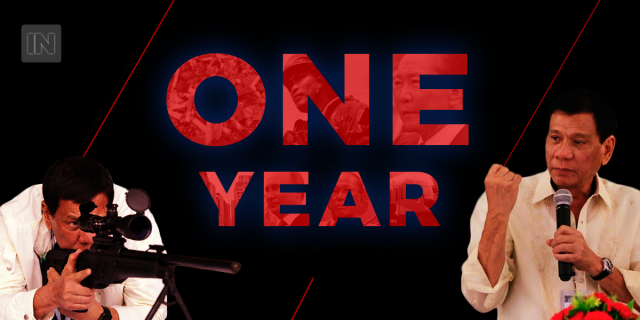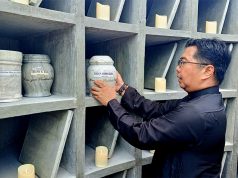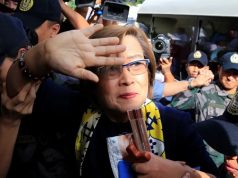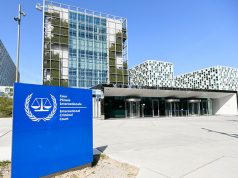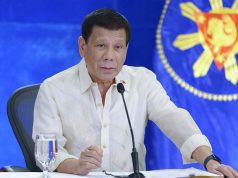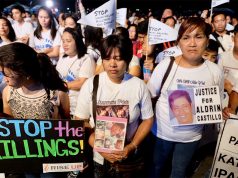1. The drug war
Duterte’s declaration of war against drugs quickly turned bloody, as it left 3,050 drug personalities dead in anti-drug operations from July 1, 2016 to May 30, 2017, according to the Presidential Communications Office.
The deaths were only a fraction of the 12,426 homicide cases being handled by the police for the same period, with 2,091 of these found to be drug-related.
As corpses were left on the streets bearing cardboards that branded them as drug addicts and drug pushers, and bonnet-wearing, motorcycle-riding killers sped away from the scene of the crime, Duterte earned critics at home and abroad.
This coincided with the Philippine National Police’s Tokhang operations, where cops knock on doors to ask suspected drug pushers and users to surrender. At least 80,415 drug personalities were arrested, leading to congested jails, while 60,395 anti-drug operations were conducted.
2. Independent foreign policy
Duterte distanced his administration from the Philippines’ long-time ally, the United States, and drew close to China and Russia, visiting both countries and their leaders in his first 365 days in office.
He sought the pullout of US troops, and was even embroiled in a spat with then US President Barack Obama after Duterte, reacting to the idea that Obama could criticize him for human rights violations related to the drug war, said, “Putang ina, mumurahin kita diyan sa forum na ‘yan (Son of a whore, I will curse you in that forum).”
That forum was the ASEAN Summit in Laos, where the scheduled meeting between the two leaders was postponed, and eventually never pushed through.
While lambasting the US, Duterte cozied up to China, which promised $15 billion worth of deals, particularly in infrastructure. But questions were raised about the track record of the Chinese companies involved. Duterte also repeteadly praised a Chinese businessman who built rehabilitation centers for drug users, though critics scoffed at the irony of Chinese building drug rehab centers when bulk of the apprehensions of illegal drugs, especially shabu, are attributed to Chinese syndicates.
Duterte’s trip to Russia, meanwhile, was cut short due to the fighting between the Maute terrorist group and government troops. The President asked Russian President Vladimir Putin for a loan for weapons before heading back to the Philippines.
3. Dutertenomics
The administration drew up an economic blueprint envisioning robust growth till 2022, on the back of a comprehensive tax reform package that policymakers said would raise the wherewithal for another anchor program: “Build! Build! Build!”, expected to usher in the golden age of infrastructure.
Projects under the infrastructure program from 2018 to 2020 are worth P3.6 trillion, according to The Philippine Star. The money will go to transportation, water resources, flood management, energy, and information communications technology, among others.
Meanwhile, under the proposed Tax Reform for Acceleration and Inclusion Act (TRAIN), which had already been approved by the House of Representatives, income tax for majority of taxpayers would decrease.
There would be a staggered increase in oil excise tax, however, while automobile excise tax would also see tax rates for luxury cars go higher as compared to other cars. There will be fewer exemptions to Value-Added Tax (VAT).
By touting a tax reform program that it describes as progressive, the administration hopes to reduce the poverty rate from 21 percent to 14 percent by 2022, and eradicate extreme poverty by 2040.
4. Marcos burial
The first year of Duterte saw the resolution of one of the most divisive issues of our time. The body of former President Ferdinand Marcos was buried at the Libingan ng mga Bayani in November, sparking rallies held by both protesters and loyalists.
The Supreme Court, voting 9-5-1, said Duterte’s decision to allow the burial of the dictator in the heroes’ cemetery was neither illegal nor a case of grave abuse of discretion.
Duterte later admitted that he was indebted to Ilocos Norte Governor Imee Marcos, the daughter of the late strongman. He described her as among those who funded his campaign, and said he had promised her that the late president would be buried at the Libingan ng mga Bayani.
Duterte even brought Imee and her brother, former Senator Bongbong Marcos, along with him on some trips abroad, acknowledging even that the ex-senator could become vice-president should he win his election protest against Vice President Leni Robredo.
5. Federalism pitch
Duterte also pushed for the shift to a federal system of government, reasoning that it would pave the way for peace in Mindanao.
He said the current system led to a president controlled by the elites, and by extension, their interests.
Experts had cited the inequality among the different provinces in the Philippines as feeding into resentments against “imperial Manila”, and thus, building support for the transition to federalism.
6. Prosecution – or persecution? – of ‘yellow’ forces
The first year of his presidency saw Duterte lashing out at key figures identified with his predecessor, the most high-profile being the prosecution of Senator Leila de Lima, one of Duterte’s most vocal critics even before he assumed the presidency. De Lima had said her shaming and vilification in the House of Representatives dominated by Duterte allies; her subsequent arrest and detention on alleged drug-related charges when she was Justice secretary, was the result of a grudge match that began in her term as Commission on Human Rights chair many years ago.
As chair of the Senate’s Justice panel, she spearheaded an inquiry into the spate of extrajudicial killings, but was later ousted from her post, and replaced by Senator Richard Gordon.
Yet another figure identified with the “Yellows”, Vice President Robredo, was directed to stop attending Cabinet meetings in December. She later quit her post as chairperson of the Housing and Urban Development Coordinating Council.
Other Liberal Party-affiliated senators were the subject of malicious rumors and fake news, with Senator Bam Aquino accused of conniving with the Maute group after he visited Marawi City to open a Go Negosyo Center days before the fighting.
A photo of Senator Kiko Pangilinan and Senator Risa Hontiveros taken at an angle to make it appear like they were holding hands also made the rounds of social media.
7. Appointment of ex-PNP and AFP officials in government
Duterte appointed a number of former officials of the PNP and the Armed Forces of the Philippines (one newspaper tallied at 59 both the high-level and low-level appointees from the uniformed forces). They included retired general Delfin Lorenzana as Defense secretary; former AFP Chief of Staff General Ricardo Visaya as the head of the National Irrigation Administration; former AFP chief General Roy Cimatu as Environment secretary; brigadier general Danny Lim as chairman of the the Metro Manila Development Authority; and marine captain Nicanor Faeldon as commissioner at the Bureau of Customs.
Duterte also selected Armed Forces chief Eduardo Año to be the next Interior Secretary, although the latter has not yet assumed the post, because he was asked to stay on at the AFP and help Defense Secretary Lorenzana after martial law was declared in Mindanao on May 23 when the Maute Group began rampaging through Marawi.
8. Marawi crisis
The first year of Duterte in office would mark almost 40 days that the fighting in Marawi has been raging. The government reported that 303 terrorists had already been killed, while on the government’s side, 75 soldiers had died; 44 civilians had been caught in the crossfire, as well.
The hostilities broke out when the military and the police tried to arrest Abu Sayyaf leader Isnilon Hapilon, but were faced with resistance. From Russia, Duterte declared Martial Law in Mindanao, then flew back home.
Air strikes and mortar assaults had reduced the city to rubble, and the locale’s 200,000 population had fled to evacuation centers in safer areas.
The military reported that residents who weren’t as lucky had been forced by the terrorists to loot homes, take up arms, or become sex slaves.
9. Duterte: a person of contradictions
Arguably one of the most striking images of Duterte was of him weeping at his parents’ tombs after he found that he won the presidency.
It revealed that there was a soft side to the former mayor, who would visit troops who were wounded in action and bring comfort to bereaved families, earning him the nickname “Tatay Digong”.
But his reckless words and frequent use of expletives could also land him in hot water, such as his recent quip to Marawi-bound soldiers that he would have their back, even if they committed rape.
The septuagenarian nevertheless kept a punishing schedule, although he was recently out of the public eye for what he said were secret trips.

